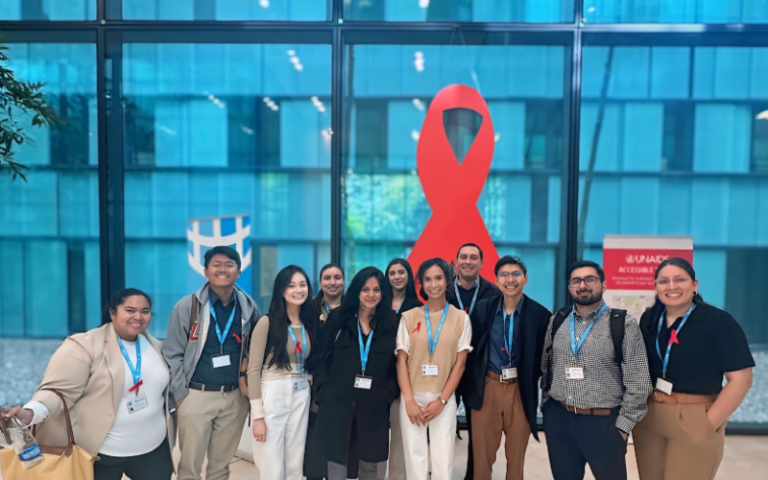After a four-year hiatus, the USC Global Health Inequalities Institute, based in the Department of Population and Public Health Sciences at the Keck School of Medicine of USC, re-offered PM 589: Global Health Governance and Diplomacy in Practice this spring. Beginning in Los Angeles and spending two weeks in Geneva, Switzerland, the course gives students immersive, hands-on experience in real-world, high-level global health forums, conversations, and events.
(Photo courtesy of the Global Health Inequalities Institute)
Through PM589, 11 Master of Public Health students were able to explore the inner workings and public spaces where health is organized, debated, and managed at the global level. Under the guidance of Institute Director Sofia Gruskin, JD, MIA, Distinguished Professor of Population and Public Health Sciences, and Institute Director Laura Ferguson, PhD, Associate Professor of Population and Public Health Sciences and Spatial Sciences, they witnessed and participated in the dynamic interplay of diplomacy, governance, policy making, and advocacy. They also received administrative support from Institute Project Specialist Caroline Diamond. This method of learning reflects a commitment to preparing students for the complexities of current and future global health challenges.
Students met with key world health organizations and participated in side events associated with the 77th World Health Assembly (WHA), the World Health Organization's decision-making body. They weren't just spectators; they actively participated in organizational briefings, asking questions, participating in scenario training, and analyzing data. Students gained first-hand insights from leaders of organizations such as Gavi, the Vaccine Alliance, which aims to improve global vaccine access.
(Photo courtesy of the Global Health Inequalities Institute)
The students met with many departments of the World Health Organization, the Sexual Rights Initiative, a coalition that advances sexual human rights in UN forums, and the Global Fund to Fight AIDS, Tuberculosis and Malaria, a global partnership dedicated to eradicating these diseases and ensuring a healthier and more equitable future. Master of Public Health student Alina Megerdisian explained, “My conversations with various representatives from intergovernmental organizations, civil society organizations, ministries of health, and even the U.S. Department of Health and Human Services' Office of International Affairs highlighted the complexities of navigating policy and advocacy amid rising geopolitical tensions, but also introduced the possibilities of contributing to global change.” The students also visited Sanitation and Water for All, the International Federation of Red Cross and Red Crescent Societies, the International Commission of Jurists, the World Trade Organization, Intersex Australia, the Joint United Nations Programme on AIDS, and the Office of the United Nations High Commissioner for Human Rights.
(Photo courtesy of the Global Health Inequalities Institute)
The conversations with organizational leaders were candid, thoughtful and inspiring, providing students with substantive knowledge and insight into what motivates those who work to advance health and human rights. Dean Madera, a Master of Public Health student, reflected on the opportunity, saying, “There are so many topics and issues on the world stage, and it's easy to feel like your advocacy is a lonely journey, but being in that environment taught me that all it takes is finding one person with the same passion to breathe new life into your advocacy.”
Students also supported side events at the World Health Assembly, providing reporting to both the NCD Alliance and the United Nations Population Fund (UNFPA). Direct participation in these activities allowed students to apply their knowledge to the real world, learning first-hand the logistics involved in hosting an event and the importance of accurately reporting on its progress.
(Photo courtesy of the Global Health Inequalities Institute)
Pushing boundaries in the face of opposition was a key theme throughout the course, including conversations with leaders who shared strategies for staying tenacious and committed even in difficult times. A new addition to the course, students were given the incredible opportunity to meet with U.S. government officials, including Assistant Secretary for International Affairs Lois Pace of the U.S. Department of Health and Human Services, and U.S. Coordinator for Global Health Security Stephanie Psaki. Students found both conversations extremely meaningful as both Assistant Secretary Pace and Stephanie Psaki shared not only their policy priorities at the World Health Assembly, but also their professional journeys and passion for public service. Master of Public Health student Iris Martinez said, “PM 589 was empowering because I had the opportunity to learn from global health leaders and witness firsthand how international organizations work with each other to protect health and human rights around the world.” Most importantly, I was humbled to learn that we can all be leaders and advocates for global health. All it takes is fighting for what you believe in and continuing to defend it no matter what challenges or opposition you face.”
And of course, the students had a blast in Geneva. The two weeks flew by with group meals, walks in beautiful parks, and dancing. The students compiled their experiences and thoughts into an Instagram Reel. Their social media posts are a testament to the friendships, laughter, and learning that came from their hands-on, experiential courses in Geneva. The Institute hopes to invite a new group of USC students to join faculty and staff in this transformative experience in spring 2025.

